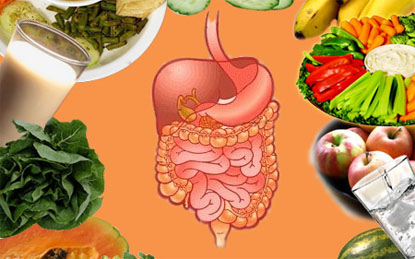Dyspepsia is a syndrome is generated by abnormal contractions of the
muscles in the digestive system within the body and abdominal pain and
changed bowel problems.
This is not a fatal disease, but "only" a syndrome, although
unpleasant, but absolutely no danger to life. However, the digestive
disorder, the patient will experience the inconvenience in activity
changed about defecation, flatulence or abdominal pain. This is a very
common syndrome, which almost anyone can be.
According to a recent study, it was found possible gastrointestinal disorders caused by many reasons, including the secretion of serotonin synapses where weather along the digestive system may play a role key. Another theory is given with methane gas surplus in the large intestine (small intestine) lead to digestive disorders.

Artwork.
Change of bowel problems
Symptoms progress slowly but a more serious every day. The change in bowel habits become clearer. Toilet suddenly no longer regularly as before. Moreover, the patient feels intermittent abdominal pain, constipation days, days of diarrhea. Depending on the condition, the patient tends to constipation than diarrhea or vice versa.
Stomach ache
The abdominal pain vary depending on the individual and is briefly described as pain, gently, shady forest, intermittent cramping, severe abdominal bloating, cantilever mercy, ran irritation, pain as "knife". Pain continuum, gently all day, cramping, painful bouts. Patients often abdominal pain on the left, but they can also suffer in many different places. Pain at once, or every day pain different places. They can also hurt the whole abdominal pain, not necessarily in any particular location. In a few rare cases, the pain may radiate to the back.
Flatulence
Bloated stomach is one of the typical symptoms of digestive disorders. Belly "distended like a drum." The patient constantly belching or "fart" constantly. The abdomen is usually very slim in the morning when he woke up, and then to gradually as the day passed slowly. Belly "great enlargement" as fast as people can vote. In addition, some patients have symptoms of gastrointestinal distress, with bouts of heartburn, bitter or bad breath, nausea, vomiting, etc ...
Psychology plays an important role when it comes to digestive disorders. So sad, depressed, melancholy will make the symptoms listed above become more frequent and more severe, including women in those days also saw periods may experience gastrointestinal disorders.

Artwork.
Identifying patients
Because dyspepsia symptoms brought along with many more serious diseases, most notably cancer (especially colon cancer), or other diseases such as stomach upset, heartburn disease, infection, inflammation colon, diseases related to thyroid, liver fluke rates, chronic pancreatitis, patients can not tolerate milk (lactose Intolerance) ..., patients need to see and do tests to confirm the diagnosis. Depending on the condition and age, the doctor will have to specify different tests.
Here's what you should know: If nature were anorexia, insomnia, weight loss, fever, bowel bleeding, loss of too much water, or unusual body becomes a very strange way of grounds, especially in those over 50 years old, maybe this is not the symptoms of digestive disorders. These patients should see a doctor as soon as possible.
How effective treatment?
Change the way you eat: Food, drinks do not cause gastrointestinal problems if unhygienic, but also foods beverages can do "disease" or worse.
The following foods can cause bloating: onion, garlic, beans, celery, cabbage, plums, bananas, raisins, basil etc ... Do not drink too much coffee and milk. Avoid foods, drinks contain too much sorbitol (this is the type of sugar used in diet soft drinks), gum or too much fructose (as in honey and some fruit).
Patients should eat more vegetables, drink plenty of water especially for patients tend to constipation.
Regular exercise can help your body in general and in particular the digestive system is functioning more effectively.

Artwork.
Medication when?
Depending on the individual, the doctor may need to be treated with different drugs. However, in the case of gastrointestinal disorders, drug played only a minor role in the treatment only. If the user should only be used when absolutely necessary and as little as possible to use.
The typical drug Dicyclomine HCl (Sudopam Tablet), hyoscyamine sulfate (levsin) can be relieved abdominal pain with diarrhea. Because the disease tends to vary with the cycle from diarrhea to constipation, so patients often taking hold loperamide (Imodium) or diphenoxylate (Lomotil) as diarrhea and medication records as constipation. Some patients with gastrointestinal disorders manifested by diarrhea may feel more comfortable when taking amitriptyline (Elavil), a medication melancholy. Summary: Although metabolic syndrome is still seen as a "mental illness", some medications can alleviate the symptoms significantly, however, the success of treatment partially dependent mechanism the patient's diet.
Conclude
It is important to visit your doctor to check exclude other diseases of the digestive tract, if you were gastrointestinal disorders should be treated calmly, adjusting reasonable diet, can use more yeast digestion as Golden LAB .... to stabilize and enhance digestive health, reduce and eliminate the symptoms of digestive disorders.
According to a recent study, it was found possible gastrointestinal disorders caused by many reasons, including the secretion of serotonin synapses where weather along the digestive system may play a role key. Another theory is given with methane gas surplus in the large intestine (small intestine) lead to digestive disorders.

Artwork.
Change of bowel problems
Symptoms progress slowly but a more serious every day. The change in bowel habits become clearer. Toilet suddenly no longer regularly as before. Moreover, the patient feels intermittent abdominal pain, constipation days, days of diarrhea. Depending on the condition, the patient tends to constipation than diarrhea or vice versa.
Stomach ache
The abdominal pain vary depending on the individual and is briefly described as pain, gently, shady forest, intermittent cramping, severe abdominal bloating, cantilever mercy, ran irritation, pain as "knife". Pain continuum, gently all day, cramping, painful bouts. Patients often abdominal pain on the left, but they can also suffer in many different places. Pain at once, or every day pain different places. They can also hurt the whole abdominal pain, not necessarily in any particular location. In a few rare cases, the pain may radiate to the back.
Flatulence
Bloated stomach is one of the typical symptoms of digestive disorders. Belly "distended like a drum." The patient constantly belching or "fart" constantly. The abdomen is usually very slim in the morning when he woke up, and then to gradually as the day passed slowly. Belly "great enlargement" as fast as people can vote. In addition, some patients have symptoms of gastrointestinal distress, with bouts of heartburn, bitter or bad breath, nausea, vomiting, etc ...
Psychology plays an important role when it comes to digestive disorders. So sad, depressed, melancholy will make the symptoms listed above become more frequent and more severe, including women in those days also saw periods may experience gastrointestinal disorders.

Artwork.
Because dyspepsia symptoms brought along with many more serious diseases, most notably cancer (especially colon cancer), or other diseases such as stomach upset, heartburn disease, infection, inflammation colon, diseases related to thyroid, liver fluke rates, chronic pancreatitis, patients can not tolerate milk (lactose Intolerance) ..., patients need to see and do tests to confirm the diagnosis. Depending on the condition and age, the doctor will have to specify different tests.
Here's what you should know: If nature were anorexia, insomnia, weight loss, fever, bowel bleeding, loss of too much water, or unusual body becomes a very strange way of grounds, especially in those over 50 years old, maybe this is not the symptoms of digestive disorders. These patients should see a doctor as soon as possible.
How effective treatment?
Change the way you eat: Food, drinks do not cause gastrointestinal problems if unhygienic, but also foods beverages can do "disease" or worse.
The following foods can cause bloating: onion, garlic, beans, celery, cabbage, plums, bananas, raisins, basil etc ... Do not drink too much coffee and milk. Avoid foods, drinks contain too much sorbitol (this is the type of sugar used in diet soft drinks), gum or too much fructose (as in honey and some fruit).
Patients should eat more vegetables, drink plenty of water especially for patients tend to constipation.
Regular exercise can help your body in general and in particular the digestive system is functioning more effectively.

Artwork.
Depending on the individual, the doctor may need to be treated with different drugs. However, in the case of gastrointestinal disorders, drug played only a minor role in the treatment only. If the user should only be used when absolutely necessary and as little as possible to use.
The typical drug Dicyclomine HCl (Sudopam Tablet), hyoscyamine sulfate (levsin) can be relieved abdominal pain with diarrhea. Because the disease tends to vary with the cycle from diarrhea to constipation, so patients often taking hold loperamide (Imodium) or diphenoxylate (Lomotil) as diarrhea and medication records as constipation. Some patients with gastrointestinal disorders manifested by diarrhea may feel more comfortable when taking amitriptyline (Elavil), a medication melancholy. Summary: Although metabolic syndrome is still seen as a "mental illness", some medications can alleviate the symptoms significantly, however, the success of treatment partially dependent mechanism the patient's diet.
Conclude
It is important to visit your doctor to check exclude other diseases of the digestive tract, if you were gastrointestinal disorders should be treated calmly, adjusting reasonable diet, can use more yeast digestion as Golden LAB .... to stabilize and enhance digestive health, reduce and eliminate the symptoms of digestive disorders.

Không có nhận xét nào:
Đăng nhận xét